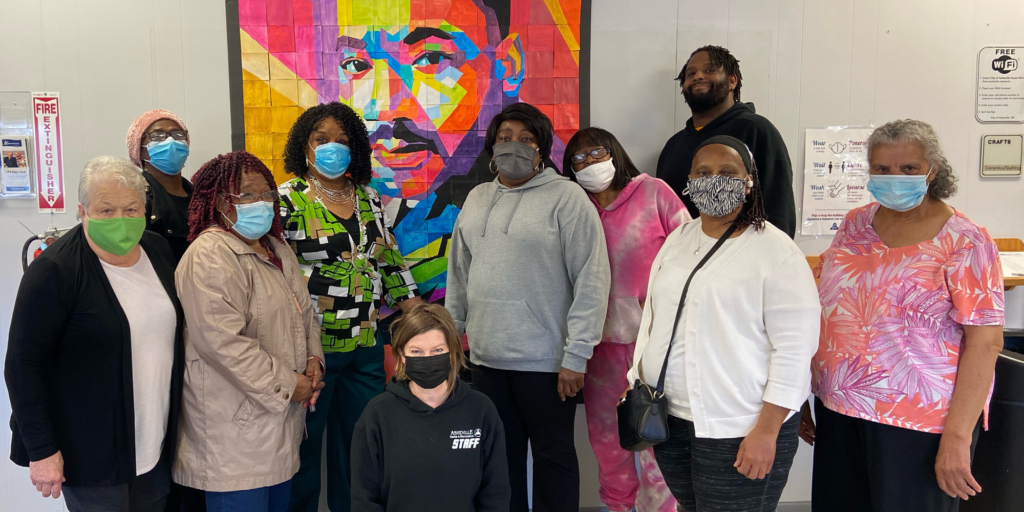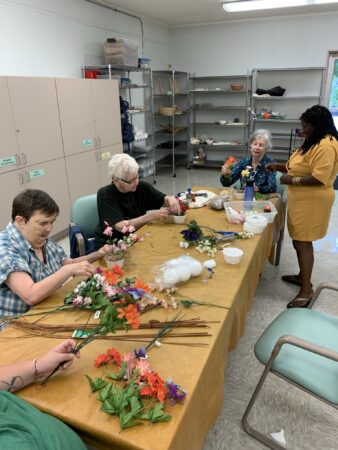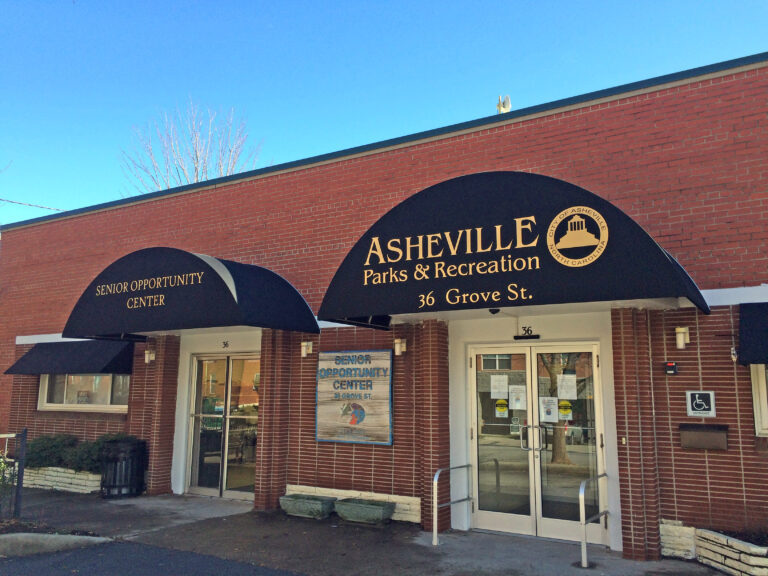Senior Opportunity Community Center holds many memories for Ashevillians of all ages. Like the city in which it is located, the building, staff, and frequent visitors have seen many changes – and one of the biggest may be in the near future. Over the past few weeks, Asheville Parks & Recreation has been asking users of the community center on 36 Grove Street, “What’s in a name?”
“As the center has evolved over the time, so has the way older adults and retirees view themselves,” according to Shateisha Bowden, Facility Manager at the center. “As people live longer and more actively, it’s perhaps unsurprising that a ‘senior opportunity center’ might seem like a place for people who are ‘old’ or ‘elderly,’ not someone still in the prime of life. As 50+, 65+, 75+, and older become more arbitrary distinctions, the name of the center may no longer fit the modern-day experience of aging or its purpose as a hub for neighbors in the Downtown, South Slope, South French Broad, and WECAN neighborhoods, as well as others nearby.”
Today, Senior Opportunity Community Center remains a focal point for active older adults to connect with vital services that help them stay healthy and independent, but offers much more to the community in general including social, cultural, and recreational activities; education and arts programs; health, exercise, and wellness opportunities; meals and nutrition services; volunteer, advocacy, and civic engagement information; and special events. The building is similar in mission to Harvest House, another Asheville Parks & Recreation community center focused on needs of the city’s actively aging residents. For this reason, the City of Asheville is exploring the possibility of renaming the Senior Opportunity Community Center in accordance with its naming policy.
Following discussions and submissions from those who already use the center, a location-based name – such as Downtown Asheville Community Center or Grove Street Community Center – appears to be the preference. From May 9-22, Asheville residents are invited to offer input online about the future name and share any special memories, connections, or photos of the center by emailing cbubenik@ashevillenc.gov.

Asheville Parks & Recreation
Established in 1954, the Asheville Parks & Recreation Department manages a unique collection of more than 65 public parks, playgrounds, and open spaces throughout the city in a system that also includes full-complex recreation centers, swimming pools, Riverside Cemetery, sports fields and courts, and community centers that offer a variety of wellness-, education-, and culture-related programs for Ashevillians of all ages. With 8 miles of paved greenways and numerous natural surface trails, its complete portfolio acts as the foundation of a vibrant hub for the people of Asheville to connect with their neighbors and explore the natural beauty of a livable and walkable city.
Driven by the promise that Asheville is a better and safer place when everyone from infants to retirees has the opportunity to be supported, healthy, and successful, Asheville Parks & Recreation was the first nationally-accredited municipal recreation department in the United States. For the latest updates, follow the department on Facebook @aprca and Instagram @ashevilleparksandrecreation or visit www.ashevillenc.gov/parks.
Senior Opportunity Center
 When Senior Opportunity Center opened in the 1970s, it was a community resource building specializing in programming and outreach services for senior citizens. Transferred to the City of Asheville by the Wright family in 1974, the center on 36 Grove Street was developed by Asheville Parks & Recreation and Buncombe County Health Department under the direction of Mayor Richard Wood who had championed several projects as part of the Model Cities antipoverty program. That initiative and the Older Americans Act of 1965, among others, were part of President Lyndon Johnson’s Great Society reforms.
When Senior Opportunity Center opened in the 1970s, it was a community resource building specializing in programming and outreach services for senior citizens. Transferred to the City of Asheville by the Wright family in 1974, the center on 36 Grove Street was developed by Asheville Parks & Recreation and Buncombe County Health Department under the direction of Mayor Richard Wood who had championed several projects as part of the Model Cities antipoverty program. That initiative and the Older Americans Act of 1965, among others, were part of President Lyndon Johnson’s Great Society reforms.
Located relatively close to affordable housing for seniors at Aston Towers and Vanderbilt Apartments, the center challenged the common-at-the-time perception that aging solely be associated with declining health, out-of-touch appearance, dependency, disability, and irrelevance. In 1978, the nearby Battery Park Hotel was redeveloped into subsidized apartments for seniors, continuing to recognize that older adults bring significant economic and civic assets to the Asheville community.
In the early years, the entities now known as Buncombe County Aging & Adult Services, Land of Sky Area Agency on Aging, and Council on Aging of Buncombe County had offices at the Senior Opportunity Center to provide social services. Asheville Parks & Recreation staff and community volunteers offered meals, arts and crafts classes, clubs for special interests and hobbies, cultural experiences, and more opportunities to stay active while aging.
Throughout the 1980s-2000s, renovations and updates included a commercial kitchen, expanded craft room, ceramic kiln, greenhouse, drop-off driveway, and outdoor picnic seating. During the Great Recession, Senior Opportunity Center programming was moved to West Asheville Community Center for a short time as both served similar populations. However, the Asheville-Buncombe Human Relations Council convinced Asheville Parks & Recreation to move all of the programs back to the center on Grove Street where they have remained.
